The False Hawk’s Beard — Crepis japonica — is not too particular where it grows. You can find it in your lawn, garden, or in sidewalk cracks. Non-native, it’s a distant Asian relative of the Dandelion. There are quite a few different species in the genus and they are all reportedly edible. Thus, if there is a Crepis near you there’s always something to forage for. Fairly easy to identify and of good taste they seem to get left out of most foraging books even though they are naturalized across North America. To learn more about the False Hawk’s Beard go here.
While it seems counter intuitive Roses seem to do well in the southern winter. They don’t like the summer heat and are a challenge to grow here. So this time of year some of them are at their blossoming best. The Rose family is a friendly one to foragers from blossoms such as this one to apples which are related. High in vitamin C, Roses have been used medicinally for about as long as man has been fiddling with medicine. As a side note back in the 90s during my mid-life crisis I decided to go to law school. I was accepted to several and to earn money before classes started I delivered flowers. It was a job with many surprises but one of them was the big, gorgeous roses we delivered for holidays like Valentine’s Day had no scent. They were bred for beauty. We had to spray artificial rose scent on them just before delivery. One also learned very quickly to spray the roses outside of the delivery van or the van and you smelled intensely of roses for several days. To read more about roses go here.
We are just a month away from the Florida Earthskills gathering in Hawthorn Florida, Feb 5-8. It’s an opportunity to learn, share and experience sustainable living skills. I have taught there for the last two years and there are virtually dozens of classes to sign up. Personally I am hoping to take a few mushroom classes. Other classes include wild medicine, wild foods, didgeridoo making and playing, buckskin sewing, fire making, yoga, insect study, cabbage palm basketry, bow making, bird songs, atlati throwing, permaculture, mushrooms and a whole lot more, several somethings for everyone. To learn more about this Florida Earthskills gathering and sign up go here.
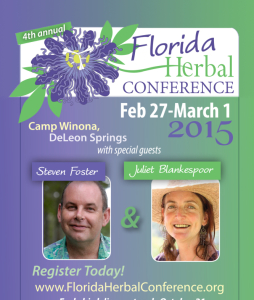 Later in February is the Florida Herbal Conference, Feb 27 to March 1st, organized by herbalist Emily Ruff. I’ve taught edible plants there for the last three years and will be there again this year. In fact I plan to spend a lot of time there. It’s a must for all southern herbalists and well as those northern ones who want to escape the cold and study their craft in the dead of winter. It always has interesting speakers and great classes. While there is some cross over between Earthskills and Herbalism the conferences are sufficiently different to justify attending both. For more information and to register go here.
Later in February is the Florida Herbal Conference, Feb 27 to March 1st, organized by herbalist Emily Ruff. I’ve taught edible plants there for the last three years and will be there again this year. In fact I plan to spend a lot of time there. It’s a must for all southern herbalists and well as those northern ones who want to escape the cold and study their craft in the dead of winter. It always has interesting speakers and great classes. While there is some cross over between Earthskills and Herbalism the conferences are sufficiently different to justify attending both. For more information and to register go here.
Foraging Classes: Saturday, January 10th, Wickham Park: 2500 Parkway Drive, Melbourne, FL 32935-2335, 9 a.m.; Sunday, January 11th, Dreher Park, 1200 Southern Blvd., West Palm Beach, 33405, 9 a.m.; Saturday, January 17th, Mead Garden: 1500 S. Denning Dr., Winter Park, FL 32789. 9 a.m.; Sunday, January 18th, Spruce Creek Park, 6250 Ridgewood Ave. Port Orange, 32127, 9 a.m. Saturday, January 24th, Red Bug Slough Preserve, 5200 Beneva Road, Sarasota, FL, 34233, 9 a.m.; Sunday, January 25th, Bayshore Live Oak Park, 23000 Bayshore Rd., Port Charlotte, FL 33980, 9 a.m., meet at the parking lot at the intersection of Bayshore Road and Ganyard Street. For more information or to sign up for a class go here.
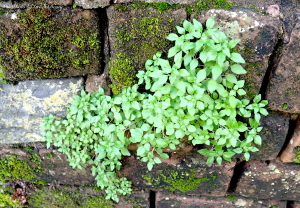
Growing exactly where one would expect to find Pellitory, along a wall this time in Savannah Georgia. Photo by Green Deane
Prime among the winter forageables is Pellitory, or Cucumber Weed. When I teach at the conference above it is a winter vegetable I expect to find. It’s usually mentioned several time in winter newsletters because it’s so ambitious and so temporary. You have to study and harvest it when its here or wait another season, a situation common to mushrooms. Pellitory is unusual in that it does not like a lot of direct sunlight so it’s growing location moves with the season. What I have also seemed to have notice is that recently Pellitory is extending its seasons, showing up earlier and lasting later. I have found in the same day sprouts of it and foot high plants. To read more about the Pellitory go here.
Another winter edible you should be scouting for is Galium aparine, or Goosegrass and a half-a-dozen other names. There are several local Galiums but Goosegrass is fairly easy to identify. First, it likes medium to drier areas than wet to medium, and it has whorls of leaves, usually six to eight. That means locally if you find a Galium and it has whorls that included seven or eight leaves you have the right one. Young growing tips are edible raw or cook and is good for the lymph system. However, it’s season is short, nearly as short as chickweed so you have to look for it now. Unmown waste areas is a good place to start, where people have piled up plant debris. To read more about Goosegrass go here.
Less Money, More Weeds. It has been said that in Chinese one of the Kanji characters for “crisis” is also the character for “opportunity.” In the West we say a dark cloud has a silver lining. Two positive effects of the economic times are influencing foraging. The first is an increase in the number of people who are putting food on the table by foraging. The interest is rising. The other is an increase in edible weeds.
One result of tight budgets is that various agencies don’t have the money to pay for weed control. Wild edibles that were often kept at bay by regular mowing or spraying are now flourishing. Along the bike trail I ride I’ve seen more edible than ever before. It’s an interesting example of how less is more, as well as a 13,000-year-old lesson.There was a time when no resources were spent controlling nature and nature provided ample food for man to survive. Then came agriculture, then cities and eventually an algae-like bloom of humans resulting in a population that cannot survive without big agriculture (though there are some ideas on how to change that.)
A century ago when most folks not only stopped foraging but started moving off the farm they planted non-edible plants about their homes and cities. They even allocated money to keep nature in check, as if nature was a green enemy. We went from being part of nature to opposing it. Nature went from being a provider to being a pain. We turned on something that has sustained humanity for eons. And more to the point, it was and is perhaps a pointless expenditure. Nature has far more resources than man and doesn’t need a bank account to get something done
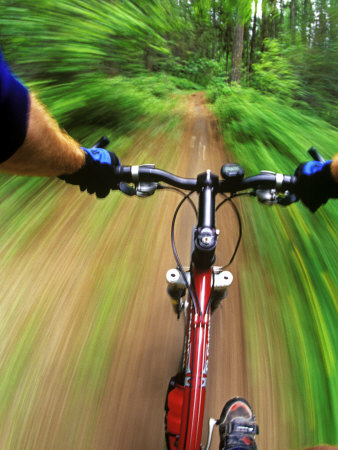 Though less plants are being mowed or sprayed the bike paths are just accessible now as they were a few years ago. They don’t need to be denuded. Nature is also responding and coming back with wild edibles: Ground cherries, peppergrass, blackberries, milkweed, yams, maypop, grain grasses. We stop spending money battling nature and nature provides more food, for free, and I can still ride the bike path. That strikes me as a win win win and a lesson not to be forgotten when economies recovers.
Though less plants are being mowed or sprayed the bike paths are just accessible now as they were a few years ago. They don’t need to be denuded. Nature is also responding and coming back with wild edibles: Ground cherries, peppergrass, blackberries, milkweed, yams, maypop, grain grasses. We stop spending money battling nature and nature provides more food, for free, and I can still ride the bike path. That strikes me as a win win win and a lesson not to be forgotten when economies recovers.
If you would like to donate to Eat The Weeds please click here

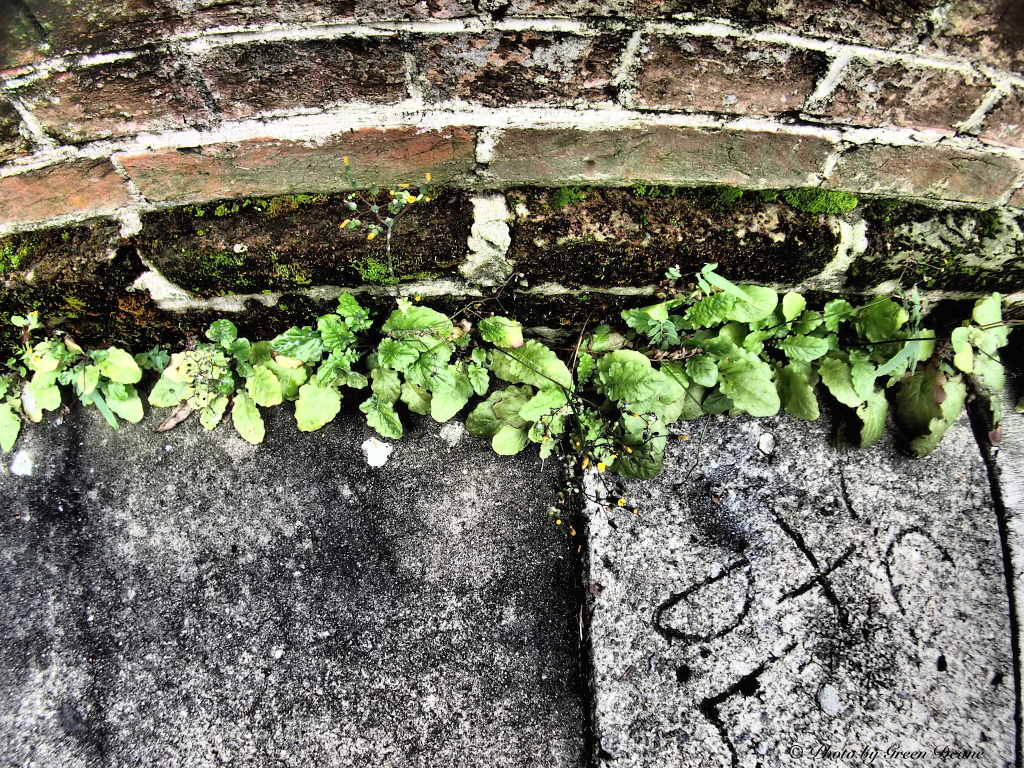
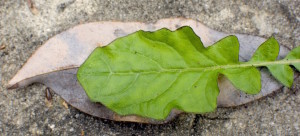
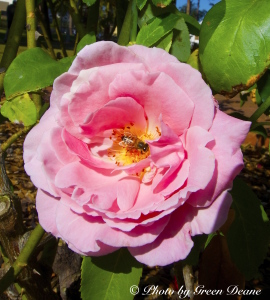
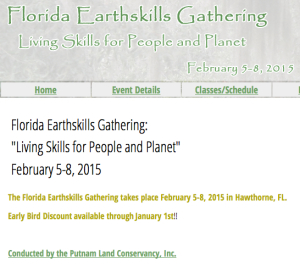
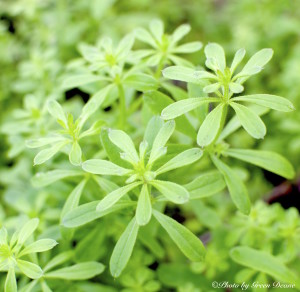
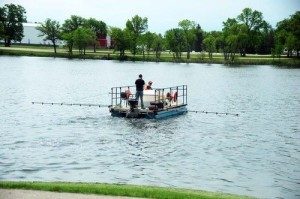
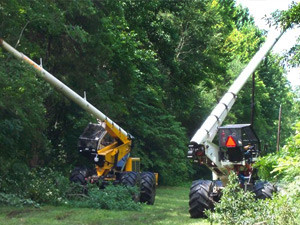
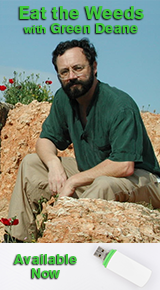
Just this afternoon I let my chickens out into the front yard where they munched on numerous crepis. Although I wasn’t directly eating it, I know that their nutritious eggs will “gift” me the benefits.
How right you are. The parks are letting their perimeters go without mowing. The result – lots of lovely weeds!
I like that experience of yours once selling roses. I think it must have left its mark positively on later life. Roses have most times been associated with love , passion and happiness. If you won’t mind, here are some songs praising roses, From my people: “He who knows not to grow roses, knows not the value of “Alnud” – Arabic for Aquilaria malaccensis, and knows not the moistness of the cheek.” Also our singer – Alshufee sings: “For the sake of you my love, the roses I’ve transplanted in my heart remain for ever reminiscent of you,” During king Farouk’s reign in Egypt and afterwards we still live with singer Asmuhan: “The beauty of lover’s cheek is designated the magical phenomenon of roses. Red roses tell about kindness, handsomeness, delicacy, and fineness. The fragranced yellow roses speak of jealousy and pain. From white roses we pick chastity, fragrance and love. Roses are really the messengers of adorers and companions of those with earnest desire and longing.” Finally the famous Iraqui song, “Ammi bayai alward” is the Arabic for “My uncle – seller of roses” – “ uncle” is assigned to any old man. After enquiring about the cost of the roses, the seller is to be blamed and become punished by Almighty God for not selling genuine roses. He has been reminded as not all fragrance is true and not all to call by the same name “roses” as the name should be reserved only for those roses he himself has grown by his own hands , watered and catered for within the rivers Tigris and Euphrates and meant only for his beloved.
In 1995 I talked with the Florida Geenways and Trails people about creating publicity and promotion of the relatively new program of connecting trails not only throughout Florida but from Mexico to Canada and beyond. I wrote a song called “On The Florida Trail”, and created printed and recorded material for them. I toured various trail sites and discovered the more than too wide paths being cut through the woods including old growth trees; watched the unmittigated use of herbicides and pesticides; and unlimited personal use of lands by both State Parks and Florida Trails employees. Land that was posted to the public. I made a complaint to the powers that be at the time and told them I thought coridors were being cleared too wide and complained about chemical use and personal use for hunting and fishing and more by employees that was prohibited for use by the tax paying public. I was told that I needed to mind my own business and stick to doing what I agreed to do with publicity and public information, so no longer felt I could participate. Hopefully with the cut backs in spending this situation will improve. I still see State employees using areas for camping and outdoor activities that are prohibited to the rest of us.
I would still be very careful about fooraging along these trails due to past and maybe present chemical use.